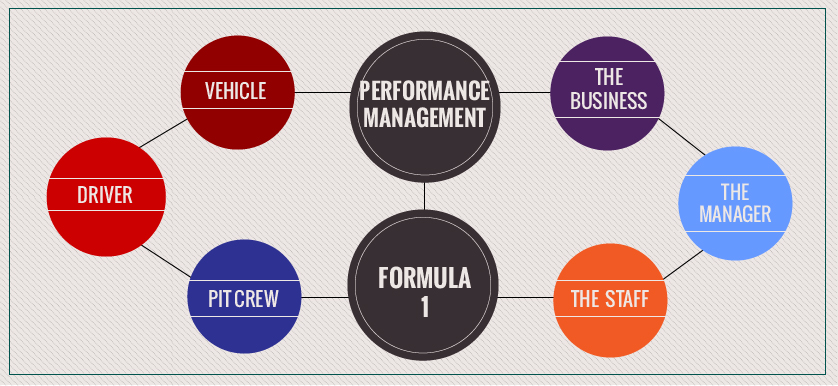So different, and yet so alike. Performance management and Formula 1

Can you imagine your organization as a Ferrari or a McLaren? Your management team as the pit crew and your sales force as the race team? A Formula 1 racing team model can be used as a metaphor for business, as they have many elements in common.
Vehicle, Driver, and Pit Crew
The Vehicle – the business itself. The capacity, functional efficiency, and speed are the elements that require the most attention. If you do not have a fast and reliable vehicle, you cannot win: neither in the F1 race, nor in the business race. So, first, you have to make sure that the vehicle gets up to full speed. In business terms, this refers to two stages: ‘Diagnosis’ and ‘Strategy’.
The Driver – the person in charge of the business. Although the performance capacity of the vehicle may be extremely impressive, it still has to be driven with skill and expertise. So, we may infer that the skills of the person driving the business have to be carefully analyzed. Back in ’76, if McLaren had not chosen James Hunt as a driver (to compete mainly with Niki Lauda for the World Champion title), probably they would not have won the championship that year.
The Pit Crew – the staff. Without attracting your people, motivating, getting the best out of them, and ‘keeping’ the best staff, it is very difficult for the vehicle to reach anywhere near-optimal performance. Pit crew performance can determine the success or failure of a race. And the same is applicable in the case of a business, with the staff members.
F1’s ”unwritten rules” apply to performance management
”A star” is not made in one race – Performance is evaluated at each race, but also throughout the season. Similarly, when evaluating management performance at the end of the review period, one should focus on different elements, such as intermediary results, projects involvement, and productivity, not just end of the year results.
Peer ranking – Formula 1 is a sport where only the best of the very best participate. So, you have your top performers and yet, there is still a ranking between them. At the end of a race, only 3 will make it to the podium and get doused in champagne. When employees or managers complain about the ranking system, they need to be reminded about Formula One, as it is the best example when it comes to peer ranking.
The past does not necessarily impact the present– Formula One drivers are aware of their talent and abilities. But they are also humble. They know that at every race, everything could be different. It should be the same when managers evaluate the performance of their employees: last year’s rating might not influence this year’s individual performance.
Instead of a conclusion, we leave you with Murray Walker’s quote, Formula 1 commentator: IF is a very long word in Formula One; in fact, IF is F1 spelled backwards.

Tags: Performance Management, Sports performance




